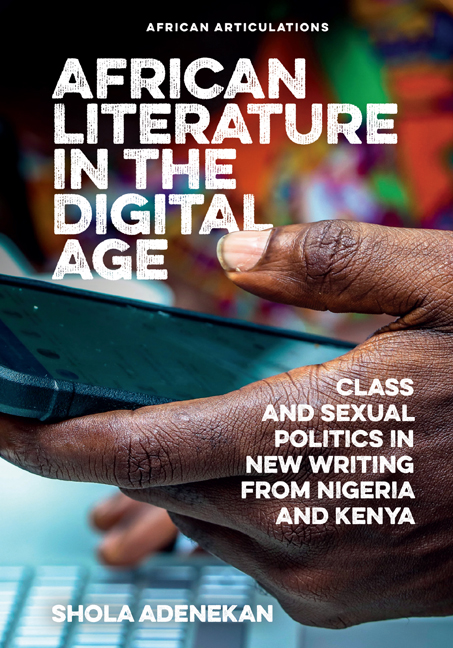 African Literature in the Digital Age
African Literature in the Digital Age Book contents
- Frontmatter
- Dedication
- Contents
- List of Illustrations
- Acknowledgements
- List of Abbreviations
- Introduction: Kenyan and Nigerian Writers in the Digital Age
- 1 Network Thinking: Literary Networks in the Digital Age
- 2 Class and Poetry in the Digital Age
- 3 Class Consciousness in Online Fictions
- 4 Digital Queer: The Queering of African Literature
- 5 Middle-Class, Transnational, Queer, and African
- 6 ‘Ashewo no be job’: The Figure of the Modern Girl in the Digital Age
- 7 The Erotic in New Writing from Nigeria
- 8 Social Media and the Aesthetics of the Quotidian
- Conclusion: Connecting the Dots
- Bibliography
- Index
- Miscellaneous Endmatter
5 - Middle-Class, Transnational, Queer, and African
- Frontmatter
- Dedication
- Contents
- List of Illustrations
- Acknowledgements
- List of Abbreviations
- Introduction: Kenyan and Nigerian Writers in the Digital Age
- 1 Network Thinking: Literary Networks in the Digital Age
- 2 Class and Poetry in the Digital Age
- 3 Class Consciousness in Online Fictions
- 4 Digital Queer: The Queering of African Literature
- 5 Middle-Class, Transnational, Queer, and African
- 6 ‘Ashewo no be job’: The Figure of the Modern Girl in the Digital Age
- 7 The Erotic in New Writing from Nigeria
- 8 Social Media and the Aesthetics of the Quotidian
- Conclusion: Connecting the Dots
- Bibliography
- Index
- Miscellaneous Endmatter
Summary
When Wole Soyinka created the character of Joe Golder in The Interpreters, he probably did not know that Golder would become the precursor to many transnational black queer characters some four decades later, in the age of the internet. One can argue that Soyinka gave some of the currently emerging African voices the literary narrative to build on, because the text helped usher in a new and different model of a queer African genre, in which alienation is collective rather than idiosyncratically personal. Most importantly, from Soyinka's generation to this new generation, the trope of the non-straight African is still regularly navigated through transnational characters that possess the right kind of education, European language skills, and the financial clout to move easily between the countries of Africa and the West. This seems to suggest that homosexuality and queerness exist only in unfixed spaces, of which transnational spaces are an ideal metaphor. Like intercultural spaces, they are interstitial, located ‘between fixed identifications’ (Bhabha 4), with flexible borders (see also Anthony Cohen). ‘Overlapping geographies’ result in ‘oscillating identities’ (Massaquoi 51). Non-straight desire seems to be the exclusivity of middle-class Africans who have had a Western-style education. Sexual deviation appears to go hand-in-hand with the notion of transnationalism, as does sexual freedom. In this way, foreignness is ascribed to queerness. For example, Golder in The Interpreters is an African-American lecturer working at a Nigerian university, but his masculinity is often called into question by his intellectual friends because of his supposed queerness. He becomes an object of constant ridicule because of his sexuality, so much so that this African-American in Africa often expresses his frustration by singing the African-American spiritual ‘Sometimes I feel like a motherless child’.
Golder's lamentation is similar to the evocation of home and Diaspora that emanates in the poems and fictional narratives that form the case studies for this paper: works that were published in the digital collection Outliers (2008). Outliers is a ground-breaking Pan-African project that articulates and theorises homoerotic choices from an Afro-diasporic perspective by bringing together writers and thinkers who are based in Africa and North America.
- Type
- Chapter
- Information
- African Literature in the Digital AgeClass and Sexual Politics in New Writing from Nigeria and Kenya, pp. 97 - 112Publisher: Boydell & BrewerPrint publication year: 2021


